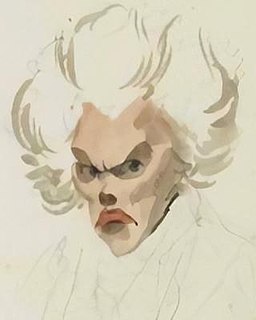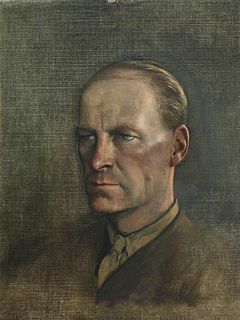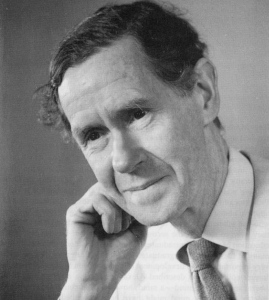Top 180 Propositions Quotes & Sayings - Page 3
Explore popular Propositions quotes.
Last updated on April 16, 2025.
Science, in its ultimate ideal, consists of a set of propositions arranged in a hierarchy, the lowest level of the hierarchy being concerned with particular facts, and the highest with some general law, governing everything in the universe. The various levels in the hierarchy have a two-fold logical connection, travelling one up, one down; the upward connection proceeds by induction, the downward by deduction.
The mathematician starts with a few propositions, the proof of which is so obvious that they are called self-evident, and the rest of his work consists of subtle deductions from them. The teaching of languages, at any rate as ordinarily practiced, is of the same general nature authority and tradition furnish the data, and the mental operations are deductive.
I think - something I learned recently looking up the meaning of ideology. If you look in American encyclopedias, it says, you know, 'Rules for - basic rules for a system of economics or politics.' If you look in the Oxford, it says that, and then it says... 'Despite - and people will hold these propositions despite events.'
If you don't know, your labor unions and community organizations, there's somebody you can ask to guide you. A lot of people, especially in the Latino community, they have this big ballot and all these names and propositions on it, and they say 'Oh my God'. They don't know which of these to vote for, so they don't vote.
Failure is instructive. The person who really thinks learns quite as much from his failures as from his successes. Genuine ignorance is profitable because it is likely to be accompanied by humility, curiosity, and open-mindedness; whereas ability to repeat catch-phrases, can't terms, familiar propositions, gives the conceit of learning and coats the mind with varnish waterproof to new ideas.
Many people who call themselves deflationists are deflationists about propositional truth but not about sentential truth. I only ever mention that view to distinguish it from disquotationalism. I don't really have any objection to it, other than that I don't believe in propositions, so I don't think there's any such thing as a proposition's being true. Truth, on my view, is primarily a property of representations, such as sentences and certain kinds of mental states.
Take note, theologians, that in your desire to make matters of faith out of propositions relating to the fixity of sun and earth you run the risk of eventually having to condemn as heretics those who would declare the earth to stand still and the sun to change position-eventually, I say, at such a time as it might be physically or logically proved that the earth moves and the sun stands still.
A great part of its theories derives an additional charm from the peculiarity that important propositions, with the impress of simplicity on them, are often easily discovered by induction, and yet are of so profound a character that we cannot find the demonstrations till after many vain attempts; and even then, when we do succeed, it is often by some tedious and artificial process, while the simple methods may long remain concealed.
There are ... other business societies - England, Holland, Belgium and France, for instance. But ours [the United States] is the only culture now extant in which business so completely dominates the national scene that sports, crime, sex, death, philanthropy and Easter Sunday are money-making propositions.
The principles of logic and mathematics are true simply because we never allow them to be anything else. And the reason for this is that we cannot abandon them without contradicting ourselves, without sinning against the rules which govern the use of language, and so making our utterances self-stultifying. In other words, the truths of logic and mathematics are analytic propositions or tautologies.
Grace abounds in contemporary movies, books, novels, films and music. If God is not in the whirlwind, He may be in a Woody Allen film, or a Bruce Springsteen concert. Most people understand imagery and symbol better than doctrine and dogma. Images touch hearts and awaken imaginations. One theologian suggested that Springsteen's 'Tunnel of Love' album, in which he symbolically sings of sin, death, despair and redemption, is more important for Catholics than the Pope's last visit when he spoke of morality only in doctrinal propositions.
No advance, no progress can be made beyond these propositions. If anyone wishes to deny their truth or their soundness, the only direction in which he can proceed historically is not forward, but backward toward a time when there was no equality, no rights of the individual, no rule of the people. Those who wish to proceed in that direction cannot lay claim to progress. They are reactionary. Their ideas are not more modern, but more ancient than those of our Revolutionary ancestors.
In experimental philosophy, we are to look upon propositions inferred by general induction from phenomena as accurately or very nearly true, notwithstanding any contrary hypotheses that may be imagined, till such time as other phenomena occur by which they may either be made more accurate or liable to exceptions.
In other words, the propositions of philosophy are not factual, but linguistic in character - that is, they do not describe the behaviour of physical, or even mental, objects; they express definitions, or the formal consequences of definitions. Accordingly we may say that philosophy is a department of logic. For we will see that the characteristic mark of a purely logical enquiry, is that it is concerned with the formal consequences of our definitions and not with questions of empirical fact.
Don't hang a dismal picture on the wall, and do not daub with sables and glooms in your conversation. Don't be a cynic and disconsolate preacher. Don't bewail and bemoan. Omit the negative propositions. Nerve us with incessant affirmatives. Don't waste yourself in rejection, nor bark against the bad, but chant the beauty of the good. When that is spoken which has a right to be spoken, the chatter and the criticism will stop. Set down nothing that will not help somebody.
I am a political recidivist. An incorrigible, repeat voter. A career lever-pusher. My electoral rap sheet is as long as your arm. Over the course of three decades, I have voted for presidents and school board members. I have voted in high hopes and high dudgeon. I have voted in favor of candidates and merely against their opponents. I have voted for propositions written with such complexity that I needed Noam Chomsky to deconstruct their meaning. I have been a single-issue voter and a marginal voter. I have even voted for people who ran unopposed. Hold an election and I'll be there.
To be sure, Darwin's theory of evolution is imperfect. However, the fact that a scientific theory cannot yet render an explanation on every point should not be used as a pretext to thrust an untestable alternative hypothesis grounded in religion into the science classroom or to misrepresent well-established scientific propositions.
Absolute space, that is to say, the mark to which it would be necessary to refer the earth to know whether it really moves, has no objective existence.... The two propositions: "The earth turns round" and "it is more convenient to suppose the earth turns round" have the same meaning; there is nothing more in the one than in the other.
Mao Zedong Thought was not created by Comrade Mao alone - other revolutionaries of the older generation played a part in forming and developing it - but primarily it embodies Comrade Mao's thinking. Nevertheless, victory made him less prudent, so that in his later years some unsound features and unsound ideas, chiefly "Left" ones, began to emerge. In quite a number of instances he went counter to his own ideas, counter to the fine and correct propositions he had previously put forward, and counter to the style of work he himself had advocated.
To reason logically is so to link one's propositions that each should contain the reason for the one succeeding it, and should itself be demonstrated by the one preceding it. Or at any rate, whatever the order adopted in the construction of one's own exposition, it is to demonstrate judgments by each other.
In our civilization, there are permanent forms which are part of every epoch and every culture. They are not especially difficult to detect. A minimal knowledge of physics, astrophysics, and perhaps mathematics, brings to light certain patterns that make these subjects easier to understand. It is striking to see the extreme similarity between these scientific propositions and the forms that recur in all times, places and civilizations.
The danger of tautological propositions is considerable in discussions of the concept of normal profits. Because supernormal profits seem to invite newcomers to an industry and sub-normal profits seem to drive away those who are in an industry, some writers are inclined to define normal profits as the earnings of the fixed resources in an industry which neither grows nor declines in size or number of firms. It should be clear that such a definition is useless: it muddles together attractiveness and actual afflux, desirbility of entry and ease of entry, zero profits and monopoly rents.
If one denies that, when the meaning is true, then the meant is what is so, one rejects propositional truth. If the rejection is universal, then it is the self-destructive proposition that there are no true propositions. If the rejection is limited to the dogmas, then it is just a roundabout way of saying that all the dogmas are false.
Accordingly, we find Euler and D'Alembert devoting their talent and their patience to the establishment of the laws of rotation of the solid bodies. Lagrange has incorporated his own analysis of the problem with his general treatment of mechanics, and since his time M. Poinsôt has brought the subject under the power of a more searching analysis than that of the calculus, in which ideas take the place of symbols, and intelligent propositions supersede equations.
Philosophy, certainly, is some account of truths the fragments and very insignificant parts of which man will practice in this workshop; truths infinite and in harmony with infinity, in respect to which the very objects and ends of the so-called practical philosopher will be mere propositions, like the rest.
I enter into discussion and argument with great freedom and ease, inasmuch as opinion finds me in a bad soil to penetrate and take deep root in. No propositions astonish me, no belief offends me, whatever contrast it offers to my own. There is no fancy so frivolous and so extravagant that it does not seem to me quite suitable to the production of the human mind.
The anceints devoted a lifetime to the study of arithmetic; it required days to extract a square root or to multiply two numbers together. Is there any harm in skipping all that, in letting the school boy learn multiplication sums, and in starting his more abstract reasoning at a more advanced point. Where would be the harm in letting the boy assume the truth of many propositions of the first four books of Euclid, letting him assume their truth partly by faith, partly by trial?
It is a matter for considerable regret that Fermat, who cultivated the theory of numbers with so much success, did not leave us with the proofs of the theorems he discovered. In truth, Messrs Euler and Lagrange, who have not disdained this kind of research, have proved most of these theorems, and have even substituted extensive theories for the isolated propositions of Fermat. But there are several proofs which have resisted their efforts.
All empty souls tend to extreme opinion. It is only in those who have built up a rich world of memories and habits of thought that extreme opinions affront the sense of probability. Propositions, for instance, which set all the truth upon one side can only enter rich minds to dislocate and strain, if they can enter at all, and sooner or later the mind expels them by instinct.
Mathematical reasoning may be regarded rather schematically as the exercise of a combination of two facilities, which we may call intuition and ingenuity. The activity of the intuition consists in making spontaneous judgements which are not the result of conscious trains of reasoning. The exercise of ingenuity in mathematics consists in aiding the intuition through suitable arrangements of propositions, and perhaps geometrical figures or drawings.
Buddha was speaking about reality. Reality may be one, in its deepest essence, but Buddha also stated that all propositions about reality are only contingent. Reality is devoid of any intrinsic identity that can be captured by any one single proposition - that is what Buddha meant by "voidness." Therefore, Buddhism strongly discourages blind faith and fanaticism.
The way in which the photograph records experience is also different from the way of language. Language makes sense only when it is presented as a sequence of propositions. Meaning is distorted when a word or sentence is, as we say, taken out of context; when a reader or listener is deprived of what was said before, and after. But there is no such thing as a photograph taken out of context, for a photograph does not require one. In fact, the point of photography is to isolate images from context, so as to make them visible in a different way.
When two terms belong to the same category, it is proper to construct conjunctive propositions embodying them. Thus a purchaser may say that he bought a left-hand glove and a right- hand glove, but not that he bought a left-hand glove, a right- hand glove, and a pair of gloves. 'She came home in a flood of tears and a sedan-chair' is a well known joke based on the absurdity of conjoining terms of different types. Now the dogma of the Ghost in the Machine does just this. It maintains that there exist both bodies and minds.
Religion is not about accepting twenty impossible propositions before breakfast, but about doing things that change you. It is a moral aesthetic, an ethical alchemy. If you behave in a certain way, you will be transformed. The myths and laws of religion are not true because they they conform to some metaphysical, scientific or historical reality but because they are life enhancing. They tell you how human nature functions, but you will not discover their truth unless you apply these myths and doctrines to your own life and put them into practice.
My son, I do not say these are foals and those asses, these little monkeys and those great baboons, as you would have me do. As I told you from the first, I regard them as earth's heroes. But I do not wish to believe them without cause, nor to accept those propositions whose antitheses (as you must have understood if you are not both blind and deaf) are so compellingly true.
We are very pleased with Vodafone's decision to adopt Windows Mobile as a preferred software platform for its mobile business. Together, we will deliver services which we expect will help Vodafone achieve cost-efficiencies while delivering new propositions to its customers, thus making Windows Mobile an even more compelling platform.
It has often been argued that absolute scepticism is self-contradictory; but this is a mistake: and even if it were not so, it would be no argument against the absolute sceptic, inasmuch as he does not admit that no contradictory propositions are true. Indeed, it would be impossible to move such a man, for his scepticism consists in considering every argument and never deciding upon its validity; he would, therefore, act in this way in reference to the arguments brought against him.
Theology asserts propositions that cannot be proven true; ideologues hold stoutly to a worldview despite being contradicted by what is generally accepted as reality. When ideology and theology couple, their offspring are not always bad but they are always blind. And there is the danger: voters and politicians alike, oblivious to the facts.
In the first place a philosophical proposition must be general. It must not deal specially with things on the surface of the earth, or within the solar system, or with any other portion of space and time. . . . This brings us to a second characteristic of philosophical propositions, namely that they must be a priori. A philosophical proposition must be such as can neither be proved nor disproved by empirical evidence. . . . Philosophy, if what has been said is correct, becomes indistinguishable from logic as that word has now come to be used.
God is omnipotent; God is wholly good; and yet evil exists. There seems to be some contradiction between these three propositions, so that if any two of them were true the third would be false. But at the same time all three are essential parts of most theological positions: the theologian it seems, at once must adhere and cannot consistently adhere to all three.
No doubt, there are those who believe that judges - and particularly dissenting judges - write to hear themselves say, as it were, 'I, I, I.' And no doubt, there are also those who believe that judges are, like Joan Didion, primarily engaged in the writing of fiction. I cannot agree with either of those propositions.
Truth then seems to me, in the proper import of the word, to signify nothing but the joining or separating of Signs, as the Things signified by them do agree or disagree one with another. The joining or separating of signs here meant, is what by another name we call proposition. So that truth properly belongs only to propositions: whereof there are two sorts, viz. mental and verbal; as there are two sorts of signs commonly made use of, viz. ideas and words.
I was trying to show colour, but I realized at the private view that the public were prisoners of a preconceived point of view and that, confronted with all these surfaces of different colours, they responded far more to the inter-relationship of the different propositions, they reconstituted the elements of a decorative polychromy.
By this we may understand, there be two sorts of knowledge, whereof the one is nothing else but sense, or knowledge original (as I have said at the beginning of the second chapter), and remembrance of the same; the other is called science or knowledge of the truth of propositions, and how things are called, and is derived from understanding.
I find myself frequently placed where I
dare give neither assent nor dissent to propositions that are submitted to me;
for there is danger that any words I may speak shall be reported as something
that the Lord has given me. It is not always safe for me to express my own
judgment; for sometimes when someone wishes to carry out his own purpose,
he will regard any favorable word I may speak as special light from the Lord
Truth is disputable; not taste: what exists in the nature of things is the standard of our judgement; what each man feels within himself is the standard of sentiment. Propositions in geometry may be proved, systems in physics may be controverted; but the harmony of verse, the tenderness of passion, the brilliancy of wit, must give immediate pleasure. No man reasons concerning another's beauty; but frequently concerning the justice or injustice of his actions.






















































